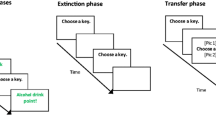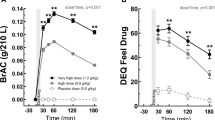Abstract
Rationale
Combining alcohol and caffeine is associated with increased alcohol consumption, but no prospective experimental studies have examined whether added caffeine increases alcohol consumption.
Objectives
This study examined how caffeine alters alcohol self-administration and subjective reinforcing effects in healthy adults.
Methods
Thirty-one participants completed six double-blind alcohol self-administration sessions: three sessions with alcohol only (e.g., beverage A) and three sessions with alcohol and caffeine (e.g., beverage B). Participants chose which beverage to consume on a subsequent session (e.g., beverage A or B). The effects of caffeine on overall beverage choice, number of self-administered drinks, subjective ratings (e.g., Biphasic Alcohol Effects Scale), and psychomotor performance were examined.
Results
A majority of participants (65%) chose to drink the alcohol beverage containing caffeine on their final self-administration session. Caffeine did not increase the number of self-administered drinks. Caffeine significantly increased stimulant effects, decreased sedative effects, and attenuated decreases in psychomotor performance attributable to alcohol. Relative to nonchoosers, caffeine choosers reported overall lower stimulant ratings and reported greater drinking behavior prior to the study.
Conclusions
Although caffeine did not increase the number of self-administered drinks, most participants chose the alcohol beverage containing caffeine. Given the differences in subjective ratings and pre-existing differences in self-reported alcohol consumption for caffeine choosers and nonchoosers, these data suggest that decreased stimulant effects of alcohol and heavier self-reported drinking may predict subsequent choice of combined caffeine and alcohol beverages. These predictors may identify individuals who would benefit from efforts to reduce risk behaviors associated with combining alcohol and caffeine.




Similar content being viewed by others
References
Bartoshuk LM (1993) The biological basis of food perception and acceptance. Food Qual Prefer 4:21–32
Buela-Casal G, Sierra J, Caballo V, Lega L (1994) Effects of alcohol and caffeine on some aspects of driving. Med Sci Res 22:515–517
Chutuape MA, de Wit H (1994) Relationship between subjective effects and drug preferences: ethanol and diazepam. Drug Alcohol Depend 34:243–251
Dietze MA, Kulkosky PJ (1991) Effects of caffeine and bombesin on ethanol and food intake. Life Sci 48:1837–1844
Drake CL, Roehrs T, Turner L, Scofield HM, Roth T (2003) Caffeine reversal of ethanol effects on the multiple sleep latency test, memory, and psychomotor performance. Neuropsychopharmacology 28:371–378. doi:10.1038/sj.npp.1300026
Evans SM, Griffiths RR, de Wit H (1996) Preference for diazepam, but not buspirone, in moderate drinkers. Psychopharmacology 123:154–163
Ferré S (2016) Mechanisms of the psychostimulant effects of caffeine: implications for substance use disorders. Psychopharmacology. doi:10.1007/s00213-016-4212-2
Ferré S, O’Brien MC (2011) Alcohol and caffeine: the perfect storm. J Caffeine Res 1:153–162. doi:10.1089/jcr.2011.0017
Ferreira SE, De Mello MT, Pompéia S, Souza-Formigoni MLO (2006) Effects of energy drink ingestion on alcohol intoxication. Alcohol Clin Exp Res 30:598–605
Ferreira SE, Quadros IM, Trindade ÁA, Takahashi S, Koyama RG, Souza-Formigoni ML (2004) Can energy drinks reduce the depressor effect of ethanol? An experimental study in mice. Physiol Behav 82:841–847
Ferreira SE, Abrahao KP, Souza-Formigoni ML (2013) Expression of behavioral sensitization to ethanol is increased by energy drink administration. Pharmacol Biochem Behav 110:245–248. doi:10.1016/j.pbb.2013.07.014
Food and Drug Administration (2010a) Update on caffeinated alcoholic beverages: FDA announces progress on removal of certain caffeinated alcoholic beverages from the market. http://www.fda.gov/NewsEvents/PublicHealthFocus/ucm234900.htm
Food and Drug Administration (2010b) Serious concerns over alcoholic beverages with added caffeine. http://www.fda.gov/ForConsumers/ConsumerUpdates/ucm233987.htm
Fritz BM, Companion M, Boehm SL (2014) “Wired,” yet intoxicated: modeling binge caffeine and alcohol co-consumption in the mouse. Alcohol Clin Exp Res 38:2269–2278. doi:10.1111/acer.12472
Griffiths RR, Bigelow GE, Liebson I (1983) Differential effects of diazepam and pentobarbital on mood and behavior. Arch Gen Psychiatry 40:865–873
Heinz AJ, de Wit H, Lilje TC, Kassel JD (2013) The combined effects of alcohol, caffeine, and expectancies on subjective experience, impulsivity, and risk-taking. Exp Clin Psychopharmacol 21:222–234. doi:10.1037/a0032337
Heinz AJ, Kassel JD, Smith EV (2009) Caffeine expectancy: instrument development in the Rasch measurement framework. Psychol Addict Behav 23:500–511
Hull JG, Bond CF (1986) Social and behavioral consequences of alcohol consumption and expectancy: a meta-analysis. Psychol Bull 99:347–360
Kponee KZ, Siegel M, Jernigan DH (2014) The use of caffeinated alcoholic beverages among underage drinkers: results of a national survey. Addict Behav 39:253–258. doi:10.1016/j.addbeh.2013.10.006
Kunin D, Gaskin S, Rogan F, Smith BR, Amit Z (2000) Caffeine promotes ethanol drinking in rats: examination using a limited-access free choice paradigm. Alcohol 21:271–277
MacKillop J, Howland J, Rohsenow DJ, Few LR, Amlung MT, Metrik J, Calise TV (2012) Initial development of a measure of expectancies for combinations of alcohol and caffeine: the Caffeine + Alcohol Combined Effects Questionnaire (CACEQ). Exp Clin Psychopharmacol 20:466–472
Marczinski CA, Fillmore MT, Stamates AL, Maloney SF (2016) Desire to drink alcohol is enhanced with high caffeine energy drink mixers. Alcohol Clin Exp Res 40:1982–1990. doi:10.1111/acer.13152
Marczinski CA, Fillmore MT, Henges AL, Ramsey MA, Young CR (2013) Mixing an energy drink with an alcoholic beverage increases motivation for more alcohol in college students. Alcohol Clin Exp Res 37:276–283. doi:10.1111/j.1530-0277.2012.01868.x
Marczinski CA, Fillmore MT, Henges AL, Ramsey MA, Young CR (2012) Effects of energy drinks mixed with alcohol on information processing, motor coordination and subjective reports of intoxication. Exp Clin Psychopharmacol 20:129
Marczinski CA (2011) Alcohol mixed with energy drinks: consumption patterns and motivations for use in U.S. college students. Int J Environ Res Public Health 8:3232–3245. doi:10.3390/ijerph8083232
Martin CS, Earleywine M, Musty RE, Perrine MW, Swift RM (1993) Development and validation of the Biphasic Alcohol Effects Scale. Alcohol Clin Exp Res 17:140–146
Martz ME, Patrick ME, Schulenberg JE (2015) Alcohol mixed with energy drink use among U.S. 12th-grade students: prevalence, correlates, and associations with unsafe driving. J Adolesc Health 56:557–563. doi:10.1016/j.jadohealth.2015.01.019
McKetin R, Coen A (2014) The effect of energy drinks on the urge to drink alcohol in young adults. Alcohol Clin Exp Res 38:2279–2285. doi:10.1111/acer.12498
McKetin R, Coen A, Kaye S (2015) A comprehensive review of the effects of mixing caffeinated energy drinks with alcohol. Drug Alcohol Depend 151:15–30. doi:10.1016/j.drugalcdep.2015.01.047
Meredith SE, Sweeney MM, Johnson PS, Johnson MW, Griffiths RR (2016) Weekly energy drink use is positively associated with delay discounting and risk behavior in a nationwide sample of young adults. J Caffeine Res 6:10–19. doi:10.1089/jcr.2015.0024
Mintzer MZ, Griffiths RR (2001) Alcohol and false recognition: a dose-effect study. Psychopharmacology 159:51–57
O’Brien MC, McCoy TP, Rhodes SD, Wagoner A, Wolfson M (2008) Caffeinated cocktails: energy drink consumption, high-risk drinking, and alcohol-related consequences among college students. Acad Emerg Med 15:453–460. doi:10.1111/j.1553-2712.2008.00085.x
Peacock A, Bruno R, Martin FH (2013a) Patterns of use and motivations for consuming alcohol mixed with energy drinks. Psychol Addict Behav 27:202–206. doi:10.1037/a0029985
Peacock A, Bruno R, Martin FH, Carr A (2013b) The impact of alcohol and energy drink consumption on intoxication and risk-taking behavior. Alcohol Clin Exp Res 37:1234–1242. doi:10.1111/acer.12086
Pennay A, Miller P, Busija L, Jenkinson R, Droste N, Quinn B, Jones SC, Lubman DI (2015) ‘Wide-awake drunkenness’? Investigating the association between alcohol intoxication and stimulant use in the night-time economy. Addiction 110:356–365. doi:10.1111/add.12742
Reissig CJ, Strain EC, Griffiths RR (2009) Caffeinated energy drinks—a growing problem. Drug Alcohol Depend 99:1–10. doi:10.1016/j.drugalcdep.2008.08.001
Rezvani AH, Sexton HG, Johnson J, Wells C, Gordon K, Levin ED (2013) Effects of caffeine on alcohol consumption and nicotine self-administration in rats. Alcohol Clin Exp Res 37:1609–1617. doi:10.1111/acer.12127
Rossheim ME, Thombs DL, Weiler RM, Barry AE, Suzuki S, Walters ST, Barnett TE, Paxton RJ, Pealer LN, Cannell B (2016) Alcohol mixed with energy drink: use may be a consequence of heavy drinking. Addict Behav 57:55–61. doi:10.1016/j.addbeh.2016.02.013
Rutledge PC, Bestrashniy JRBM, Nelson TF (2016) Problematic drinking among postgraduate students: binge drinking, prepartying, and mixing alcohol with energy drinks. Subst Use Misuse 51:1–11. doi:10.3109/10826084.2016.1152499
Schuckit MA (1994) Low level of response to alcohol as a predictor of future alcoholism. Am J Psychiatry 151:184–189
Smith AP (2013) Effects of caffeine and alcohol on mood and performance changes following consumption of lager. Psychopharmacology 227:595–604. doi:10.1007/s00213-013-2991-2
Stahre M, Roeber J, Kanny D, Brewer RD, Zhang X (2014) Contribution of excessive alcohol consumption to deaths and years of potential life lost in the United States. Prev Chronic Dis 11:130293. doi:10.5888/pcd11.130293
Thombs DL, O’Mara RJ, Tsukamoto M, Rossheim ME, Weiler RM, Merves ML, Goldberger BA (2010) Event-level analyses of energy drink consumption and alcohol intoxication in bar patrons. Addict Behav 35:325–330. doi:10.1016/j.addbeh.2009.11.004
Thombs D, Rossheim M, Barnett TE, Weiler RM, Moorhouse MD, Coleman BN (2011) Is there a misplaced focus on AmED? Associations between caffeine mixers and bar patron intoxication. Drug Alcohol Depend 116:31–36. doi:10.1016/j.drugalcdep.2010.11.014
Verster JC, Benjaminsen JM, van Lanen JH, van Stavel NM, Olivier B (2015) Effects of mixing alcohol with energy drink on objective and subjective intoxication: results from a Dutch on-premise study. Psychopharmacology 232:835–842. doi:10.1007/s00213-014-3715-y
Vida K, Rácz J (2015) Prevalence and consequences of the consumption of alcohol mixed with energy drinks: a literature review. J Caffeine Res 5:11–30
Wells BE, Kelly BC, Pawson M, Leclair A, Parsons JT, Golub SA (2013) Correlates of concurrent energy drink and alcohol use among socially active adults. Am J Drug Alcohol Abuse 39:8–15. doi:10.3109/00952990.2012.720320
World Health Organization (2014) Global status report on alcohol and health. World Health Organization, Geneva
Acknowledgments
National Institutes on Drug Abuse grant R01DA003890 supported this work. NIDA grant T32DA07209 supported Mary Sweeney, Steven Meredith, and Daniel Evatt. The authors thank Zainab Jackson for her assistance in conducting this research.
Author information
Authors and Affiliations
Corresponding author
Ethics declarations
Conflict of interest
The authors declare that they have no conflict of interest.
Rights and permissions
About this article
Cite this article
Sweeney, M.M., Meredith, S.E., Evatt, D.P. et al. Effects of caffeine on alcohol reinforcement: beverage choice, self-administration, and subjective ratings. Psychopharmacology 234, 877–888 (2017). https://doi.org/10.1007/s00213-017-4528-6
Received:
Accepted:
Published:
Issue Date:
DOI: https://doi.org/10.1007/s00213-017-4528-6




